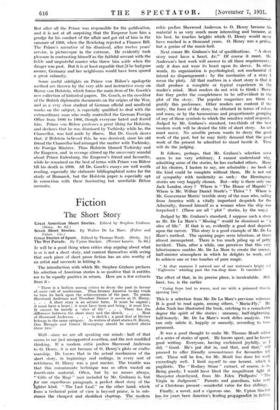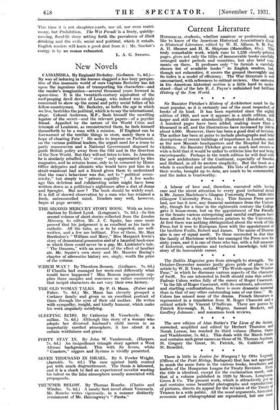Fiction
The Short Story
Great American Short Stories. Edited by Stephen Graham. (Henn. 8s. 6d.) IT will be a good thing when critics stop arguing about what is or is not a short story, and content themselves with seeing that each piece of short prose fiction has an aim worthy of an artist and succeeds in hitting it.
The introduction with which Mr. Stephen Graham prefaces his selection of American stories is so positive that it entitles me to be equally positive in return. Here are a few extracts from it :
" There is a fashion among critics to decry the past in favour of some cult of modernism. Thus literary America to-day tends to', turn its back upon the achievements of the past. To praise Sherwood Anderson and Theodore Dreiser it sneers at 0. Henry.
. . A short story is an artistic form. It must be organic ; it must have a heart ; it must have form and being ; it must live. It cannot be merely a ' slice of life ' . . . There lies the difference betWeen the short story and the sketch. . . . Most of Sherwood Anderson . . . is sketch ; a good deal of Dreiser belongs to the same category. As writers of short stories 0. Henry, Don Marquis and Ernest Hemingway should be ranked above these two."
Well—since we are all speaking our minds—half of that seems to me just unsupported assertion, and the rest muddled thinking. If a modern critic prefers Sherwood Anderson to 0. Henry, it is not because of 0. Henry's 'plots or crafts- manship. He knows that in the actual mechanism of the short story, in beginnings and endings, in every sort of artfulness, 0. Henry was a past master. The trouble was that this consummate technique was so often wasted on fourth-rate material.. Often, but by no means always. " Gifts of the Magi " (not included by Mr. Graham) is, but for one superfluous paragraph, a perfect short story of the lighter kind. " The Last Leaf," on the other hand, which
from a technical point of view is beyond praise, is in sub- stance the cheapest and shoddiest claptrap. The modern.
critic prefers Sherwood Anderson to 0. Henry because his material is so very much more interesting and because, at his best, he touches heights which O. Henry would never have reached in a thousand years. 0. Henry was a genius, but a genius of the music-hall.
. Next comes Mr. Graham's- list of qualifications. " A short story must have a heart, &c." Of course it must. Mr. Anderson's best work will answer to all these requirements : only it does not wear its heart upon its sleeve. In other words, its organization is psychological, not mechanical (I intend no disparagement : by the 'mechanics of a story I mean the plot). All. that matters. in a short story is that it shall produce a complete or typical experienae in the reader's mind. Most readers do not wish to think t Aere- fore they prefer the completeness to be self-evident in the plot of the story. The popular magazines are there to gratify this preference. Other readers are content if the unity, the form of the story, be obtained in terms of colour and mass, or by the harmonious and proportionate grouping of any of those symbols to which the sensitive mind respond,. Judged by Mr. Graham's standard, two-thirds of the best modern work will be denied the title of short story. An art must move. No sensible person wants to decry the good work of the past, but he may fairly demand that the good work of the present be admitted to stand beside it. Time will do the judging.
It follows, perhaps, that Mr. Graham's selection must seem to me very arbitrary. I cannot understand why, admitting some of the stories, he has excluded others. Many of his choices, I hasten to say, are admirable : no book of the kind could be complete without them. He is not out of sympathy with modernity as such : the Hemingway stories are very happily chosen. But—why is there only one Jack. London story ? Where is " The House of Mapuhi ? Where is Mr. Wilbur Daniel Steele's " Thirst " ? Where is Mr. Gouverneur Morris' terrible story of the man who, sailing from America with a vitally important despatch for the Admiralty, dressed himself as a woman when the ship was torpedoed ? (These are all " plot " stories, by the way.) Judged by Mr. Graham's standard, I suppose such a story as Mr. De La Mare's " Missing " would be dismissed as a slice of life." If that is so, evidently a good deal depends upon the carver. This story is a good example of Mr. De La Mare's method. The opening pages seem laborious, at times almost incompetent.. There is too much piling up of petty incident.. Then, after a while, one perceives that this very laboriousness enables Mr. De La Mare to create the uneasy, half-sinister atmosphere in which he delights to work, and to achieve one or two touches of pure magic.
" At that moment I noticed one of our waitress's bright-. red ' Eighteens ' whirling past the tea-shop door. It vanished."
The effect of that, in its precise place, is incalculable. Bril- liant, too, is the earlier
" Going from bad to worse, and me with a poisoned thumb, opening tins."
This is a selection from Mr. De La Mare's previous volumes. It is good to read again, among others, " Maria-Fly." Mr. John Nash has illustrated the book, catching to a remarkable degree the spirit of the stories : uncanny, half-frightening, half-homely. Mr. De La Mare's work defies analysis. One can only salute it, happily or uneasily, according to tem- perament.
It was a good thought to make Mr. Thomas Moult editor of a series of stories of sport. He knows sport, and he knows good writing. Everyone, having exclaimed joyfully, as I did, " Good. He's put that in, and that, and that," will proceed to offer friendly remonstrance for favourites left out. These will be few, for Mr. Moult has done his work exceedingly well. I limit myself -to -one lament, which is pugilistic. The " Rodney Stone " extract, of course, is in. Being greedy, I would have liked the magnificent fight in Sheepstor churchyard, from Mr. Eden Phillpotts' " The Virgin in Judgment." Parents and guardians, - take note of a Christmas Present—wonderful value for five shillings.
Finally, a novel, and a Vigorous one. Mr. Upton Sinclair has for years been America's leading propagandist in_fiction.
This time it is not slaughter-yards, nor oil, nor even matri- mony, but Prohibition. The Wet Paraders a lively, quickly- moving, flood-lit story setting forth the prevalence of illicit drinking and the evils; social and political, which it entails. English readers will learn a good deal from it : Mr. Sinclair's energy is by no means exhausted.
L. A. G. STRONG.















































 Previous page
Previous page